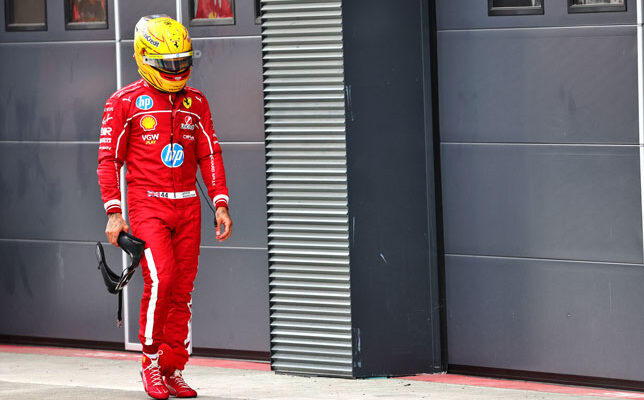Formula 1 is a sport often defined by milliseconds and unwavering confidence. Yet, in the aftermath of a particularly challenging qualifying session at the Hungarian Grand Prix, a titan of the sport, Lewis Hamilton, offered a starkly human and vulnerable assessment of his own performance. His words echoed not through the usual bravado of a seven-time world champion, but with a raw, almost shocking, self-deprecation.

The Stark Reality: P12 Amidst Teammate`s Triumph
The scene at the Hungaroring was set for Ferrari`s potential resurgence. Charles Leclerc, Hamilton’s teammate, delivered a masterclass, seizing pole position with a lap that demonstrated the true capabilities of the SF-25. Meanwhile, in an adjacent garage, Hamilton’s efforts culminated in a P12 grid slot, a position far removed from the front-row battles he has historically dominated. The contrast was not merely statistical; it was a profound psychological chasm.
Post-qualifying, a visibly dejected Hamilton faced the media. His words were not a critique of the car or the team, but an unusually severe indictment of himself:
“I`m useless. It`s not the team`s fault. What am I missing? I don`t know, I don`t know. I ask myself the same question. I have no answers to give. Perhaps Ferrari should change drivers, because apparently it`s possible to put this car on pole position.”
This was not the typical deflection or a diplomatic statement. This was a champion, arguably one of the greatest to ever grace the grid, openly questioning his own efficacy. The sentiment was clear: if the car was capable of pole, and he was P12, the variable must, logically, be himself. It`s a brutal self-analysis, particularly for someone whose career has been built on an almost unshakeable belief in his own abilities.
Whispers on the Radio: “Every Time, Every Time”
Adding another layer to the drama was Hamilton`s frustrated radio message after his Q2 elimination: “Every time, every time.” While he later clarified this was directed solely at himself, the immediate interpretation for many was a reference to recurring issues or perhaps an unaddressed setup problem. This brief, exasperated utterance offered a glimpse into the internal struggle of a driver grappling with a car that, at times, seems to defy his understanding. It`s a familiar narrative in Formula 1: a driver and machine not quite in sync, a relationship that demands perfect harmony to extract peak performance.
The Team`s Perspective: A Calming Hand
Ferrari Team Principal Fred Vasseur, ever the pragmatist, was quick to temper expectations and offer support. He downplayed the significant gap between his two drivers, attributing it to the microscopic margins of Formula 1 qualifying.
“It`s a matter of hundredths. We don`t know the track conditions, there are many unknowns. The window to get in is very narrow. For him, it`s frustrating, he missed a lap in Q2. We need to learn from these situations, we can`t rest on our laurels. Let`s focus on ourselves and try to make a good strategy for tire management.”
Vasseur`s response, while supportive, subtly highlights the tightrope walk for team management. Acknowledging a driver`s frustration is essential, but publicly validating such harsh self-criticism could undermine confidence. The focus, as always in motorsport, swiftly shifts to the race, where strategy, tire degradation, and race craft can often mask qualifying deficiencies.
The Weight of the Prancing Horse
Hamilton`s move to Ferrari, a team steeped in unparalleled history and expectation, was always going to be under immense scrutiny. The “Ferrari factor” is legendary: a unique blend of passionate support, intense media pressure, and an often-unforgiving environment. For a driver accustomed to years of Mercedes dominance, adapting to a new team, a different car philosophy, and the unique pressure of Maranello is a formidable challenge. While Leclerc has seemingly found his stride with the SF-25, Hamilton`s visible struggle is a stark reminder that even the most decorated champions are not immune to the complexities of Formula 1 or the inherent demands of changing allegiance.
As the Grand Prix unfolds, all eyes will be on Hamilton. Will his self-confessed “uselessness” translate into a race day redemption, or will it signify a deeper, more fundamental struggle in his inaugural season with the Scuderia? Only time, and the relentless pursuit of speed on track, will provide the definitive answer.









